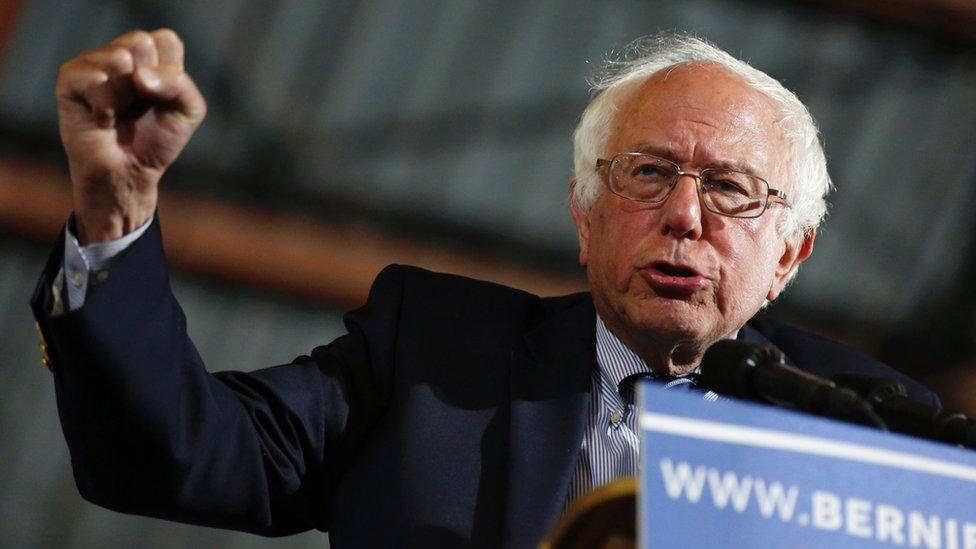US elections: Obama calls for Democratic unity
- Published
President Obama speaking to Jimmy Fallon on The Tonight Show: "My hope is, that over the next couple of weeks, we're able to pull things together"
President Obama says he hopes the Democrats "pull things together" after Hillary Clinton became the party's presumptive nominee for president.
Her rival, Bernie Sanders, has vowed to fight on despite pressure to step down from party figures.
Mr Obama stopped short of calling for Mr Sanders to drop out, instead saying the Vermont senator had made Mrs Clinton a "better candidate".
The two men are due to meet at the White House later on Thursday.
Afterwards, President Obama is tipped to formally endorse Mrs Clinton and call for the party to unite against the presumptive Republican nominee, Donald Trump.
Speaking on NBC's Tonight Show, Mr Obama admitted the race had been "ouchy".
But he went on to say this was welcome: "It was a healthy thing for the Democratic Party to have a contested primary.
"I thought that Bernie Sanders brought enormous energy and new ideas. And he pushed the party and challenged them. I thought it made Hillary a better candidate."
He added: "My hope is, is that over the next couple of weeks, we're able to pull things together."
Mrs Clinton won four out of six primaries on Tuesday, giving Mr Sanders virtually no path to the nomination.
Mr Sanders will also meet Democratic leader Harry Reid on Thursday, who has urged him to drop out.
"Sometimes you just have to give up," he said earlier this month.
Mr Sanders will headline a Washington rally on Thursday evening. District of Columbia voters will go to the polls on 14 June.

Analysis - Anthony Zurcher, BBC News North America Reporter
A time of reckoning has arrived for Bernie Sanders. Does he want to claw against the Democratic establishment up to its July national convention - and beyond? Or will he cut a deal, then work within the party structure to harness the enthusiasm his "revolution" has generated?
The scions of the establishment, from President Barack Obama on down, prefer the latter, of course.
"I thought that Bernie Sanders brought enormous energy and new ideas," the president told Jimmy Fallon on the Tonight Show on Wednesday night. "And he pushed the party and challenged them."
Note the use of the past tense.
Mr Sanders will likely hear more such carefully phrased praise when he meets the president on Thursday - then direct talk about how the Vermont senator can help his recently adopted party beat Republican presumptive nominee Donald Trump.
Mr Sanders may have other plans, however. Democratic officeholders who supported the senator have begun backing away from him, and Massachusetts Senator Elizabeth Warren - a progressive movement star - appears to be on the verge of endorsing Hillary Clinton.
But the Vermont senator could decide that his movement is best served as a political force that exerts influence on the Democratic Party from the outside, not within.


Democratic presidential candidate Bernie Sanders will meet Mr Obama later on Thursday
Five ways to predict the next president
Despite this, he said he planned to "fight for every vote" in the next primary - the last before the nomination convention next month.
Mr Trump has pitched to Mr Sanders' supporters, external: "Bernie Sanders must really dislike Crooked Hillary after the way she played him. Many of his supporters, because of trade, will come to me."
But Mr Sanders said his campaign would not support Mr Trump, "a candidate whose major theme is bigotry".
During his interview, Mr Obama said he was "worried" for the Republicans, saying the US needed a "healthy two-party system".
"The main role I`m gonna be playing in this process is to remind the American people that this is a serious job," he said.
"You know, this is not reality TV. I've seen the decisions that have to be made. And the work that has to be done," he added, in a clear barb aimed at Mr Trump, a former star of TV series the Apprentice.